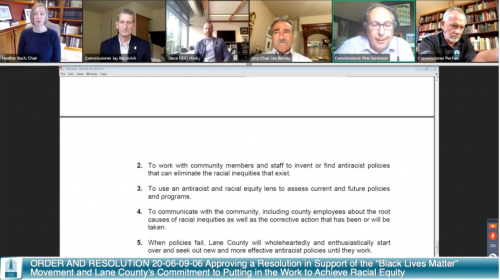
On Tuesday, June 9, the Lane County Board of County Commissioners unanimously passed a resolution acknowledging that black lives matter and committing to be anti-racist. Chair Heather Buch had promised to pass this resolution Friday, June 5, after Eugene had had a week of protesting.
On June 3, the Lane County Board of Commissioners directed the county staff to work with the Equity and Access Advisory Board to draft the resolution. According to the meeting documents, Commissioner Pat Farr pointed out three items to have in the resolution: recognize that this is the moment to make the decision to acknowledge that black lives matter, list action items for the county to do and not to focus on property damage.
The resolution lists five goals. First, to work with community members and staff to acknowledge and address the root causes of inequities and outcomes. Second, invent or find anti-racist policies that eliminate existing racial inequalities. Third, use an anti-racist and racial equity lens to address current and future policies and programs. Fourth, communicate with the community about the root causes of racial inequities and the corrective action that has been used or will be used. Lastly, should policies fail, the county will find more effective and anti-racist policies.
County commissioners added a requirement for a periodic follow-up from the Equity and Access Advisory Board.
“That’s something that would solidify the resolution,” Buch said.
The resolution addressed the point but didn’t go into the specifics of recruitment and hiring law enforcement, said Equity and Access Coordinator Mo Young at the meeting. She added that the board is finding ways to focus on institutional policies and practices that have led to disparities in areas like policing, health and planning.
During the meeting, Commissioner Pete Sorenson said maybe it’s time to also reconsider renaming Lane County, named after Joseph Lane, a supporter of slavery. Sorenson said that King County in Washington changed its name in 1986 to reflect Martin Luther King Jr. instead of William King.
“Why aren’t we named for another Lane?” Sorenson said. “We ought to be thinking about the very name of our community.”
Sorenson then read a few lines from Neil Young’s “Southern Man,” a song that he said was popular when he was a senior in high school.
“What really opened my eyes to this was my work in the Carter administration,” he said. “Eight years after ‘Southern Man’ came out, I was in Greenville, Mississippi, with a delegation of people looking at the economic conditions in the Mississippi Delta with the big white mansions and the sad shacks behind them.”
Commissioner Jay Bozievich has said in past meetings that he doesn’t like resolutions that don’t have action items; otherwise, it’s just expensive virtue signaling, he has said.
Bozievich said he had suggested edits on a few statements but he would support the resolution no matter what.
He spoke about his family’s history of being minorities — as well as his upbringing in a predominantly Jewish neighborhood. But he said none of that compares to the racism that black people continue to face today.
He said he was uncomfortable with the use of the word “murder” in the resolution and would prefer to use “killing” instead.
“I do agree it’s hard to watch the videos and not come to the same conclusion,” he said, adding that using the word murder bypasses the killer’s right to a fair trial.
Earlier in the meeting, Young did explain the equity and access’s rationale for using murder instead of alleged or killing. She said the board was concerned that using those words instead of “murder” would downplay what happened to George Floyd.
The county action is the first formal acknowledgment in the area of black lives matter with a follow up of action.